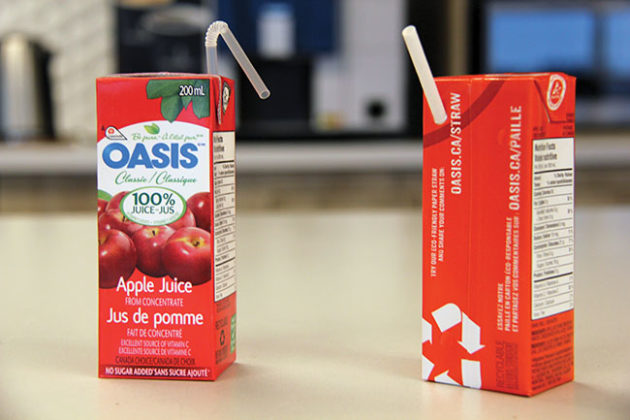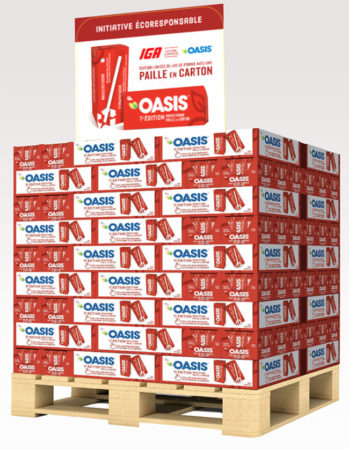
The Straw Poll
George Guidoni
Design & Innovation Sustainability Design Plastic Allen’s Fruité FSC (Forest Stewardship Council) IGA Lassonde Industries Inc. Oasis Pigeon Brands Inc. Rougemont Tetra PakVenerable Quebec juice producer happily testing the waters with paper drinking straws as part of far-reaching sustainability efforts
Drawing a short straw may not sound like a stroke of luck, but it just may be the missing link in ongoing efforts by leading beverage producers like Lassonde Industries Inc. to negate the environmental impact of single-use plastic drinking straws by taking plastic out of the equation.
As one of North America’s leading producers of ready-to-drink juices and fruit and vegetable beverages—marketed in Canada under the Oasis, Allen’s, Rougemont, Fruité and other familiar brand names—the Rougemont, Que.-headquartered company has long been one the industry’s forefront pioneers in respect to sustainable packaging.
Having invested well over $20 million since 2013 to make its PET (polyethylene terephthalate) plastic containers more lightweight and recyclable, Lassonde is also a major end-user of the Tetra Pak range of aseptic beverage cartons, which are widely lauded for their recyclability, renewability and other environmental attributes.
Widely used for years to package Lassonde’s Oasis range of single-serve fruit juices, the 200-ml brick-shaped drink cartons had become a popular mainstay at school lunch-boxes across Canada with their easy portability and convenience-enhanced with the inclusion of plastic bendy-type drinking straws attached to carton’s side panels.
Unfortunately, this convenience came with an environmental cost in terms of additional plastic straw waste that, in some facilities, is hard to recover and recycle.
To address this shortcoming, Lassonde has recently embarked on a comprehensive strategy designed to eliminate all plastic straws from its packaging by 2025, starting with a pilot program aimed at market-testing the commercial feasibility of shorter new paper straws intended to replace them.
Launched in mid-November last year at 14 designated IGA grocery stores and 10 St-Hubert restaurants in and around the greater Montreal area, the 200-ml boxes of Oasis 1st Edition apple juice come with a shorter and stubbier 100-mm straw made entirely of FSC (Forest Stewardship Council)-certified paper.

The standard Tetra Pak 200-ml beverage carton used to package single-serve portions of the Oasis brand apple juice utilizes a plastic bendy straw (left) stands opposite the redesigned Tetra Pak drink box featuring a foil-lid opening on the side panel for insertion of a paper straw made from FSC-certified paperboard as part of a limited product launch by the brand-owner Lassonde Industries to test the new paper straw’s environmental and commercial viability.
“In the past few months, we have committed to finding sustainable solutions for making our containers more eco-responsible [and] this initiative is a first step in that direction,” said Lassonde Industries president and chief operating officer Jean Gattuso.
According to Lassonde, this initiative aligns with the company’s vision of sustainable development and efforts to promote the emerging Circular Economy model of package design to enable the company to meet its targets of 100-percent recyclable packaging for all it’s products, along with at least 20-percent PCR (post-consumer recycled) content in its packaging by 2025.
Unlike the traditional 155-mm plastic straw it aims to replace, the new paper straw—slightly angled at the bottom tip for easy entry—is inserted through the carton’s tine foil opening from the side of the box rather than from the top of the carton.
“This represents the first commercial use of a paper straw in North America,” says Lassonde Industries general manager of marketing, revenue management and product development Claire Bara, noting the introduction of a new straw material and the repositioning of the foil lid off to the side of the box were

Claire Bara, Executive Vice-President & General Manager, Marketing, Revenue Management & Product Development, A. Lassonde Inc.
more challenging than they first appear.
“Because the straw opening has been moved to the side of the box, we had to make certain adjustments on the production line equipment, in addition to finding the right suppliers,” Bara told Canadian Packaging in a recent interview.
“Sometimes people don’t fully understand the impact of what looks like a very small change,” Bara says, “but it was a considerable effort that also involved a lot of market research testing leading up to the November launch.
“When we first started looking for a paper straw alternative, we found that there was no supplier in North America that had this sort of product,” says Bara.
“We needed a straw that would be efficiently applied on our existing equipment and would also be strong enough to last through the whole consumer experience,” she states, crediting Tetra Pak for supplying the required straws.
To draw attention to the new straw, Lassonde also worked with its long-time packaging design partner Pigeon Brands Inc. to develop a new graphic design for the 200-ml box to emphasize the straw switch.
Featuring solid red colors and white typography clearly identifying the new packaging features, “This distinctive design clearly communicate to consumer what this product is about and what they are getting with this product,” Bara states.
“We wanted to make sure that consumers would understand that this is not your regular Tetra Pak juice box,” she says, “and Pigeon Brands has conveyed that message perfectly.”
Dispensing with the traditional product photography and illustrations, the Oasis 1st Edition design also features the familiar arrowed recycling logo and a callout to consumers to share their opinions about the new straw on the www.oasis.ca/straw web page.
According to Pigeon Brands national managing director Elyse Boulet, the Pigeon team utilized a creative strategic approach to develop compelling messaging that hit the mark, complimented by a sleek and modern graphic design.
“At Pigeon we take sustainability very seriously,” Boulet states. “While this is an iterative approach to design, each little step truly counts.
“We believe it’s better to start now than to wait for the perfect product, which is what we preach to our clients every day.
“This paper straw is a revolutionary idea, and we’re proud to have partnered with Lassonde and that it’s come from a Canadian company,” Boulet proclaims.
“We have got lot of reaction and feedback both on our website and in the social media already,” adds Bara, noting Lassonde is currently compiling and analyzing the gathered information to determine what other improvements it can make to the 200-ml carton packaging.
“We don’t pretend that we have found the perfect solution,” Bara states, “but based on the terrific reception so far I think we are moving in the right direction.
“Consumers are excited by what we are doing, and even though some of the older consumers may at first seem puzzled by the opening being on the side, the younger ones seem to pick it up almost instinctively,” she says.
“Changing habits does not always happen automatically,” Bara says, “but the whole area of sustainability is all about changing our consumption habits for the greater good of the planet.”
“There is no perfect solution today, but we believe we’re doing the right thing by putting something new into the market, gather feedback, and go on to working on an improved version,” says Bara, citing healthy enthusiasm for the Oasis 1st edition launch by its partners IGA and St-Hubert.
“Our 14 participating IGA supermarkets in Quebec are proud to be the first to collaborate on this ground-breaking initiative,” says Luc L’Archevêque, IGA’s senior vice-president of merchandising and general manager for Quebec.
“Being able to offer our consumers a new product that will have a positive impact on our planet fits perfectly with our vision of sustainable development,” L’Archevêque adds.

A pallet load of cartons of filled with the Oasis 1st edition apple juice cartons designed by Pigeon Brand creates an attractive high-impact in-store display at an IGA supermarket in Quebec.
“At IGA, we have put forward several environmentally-friendly initiatives, and our collaboration with Lassonde in this project allows us to continue to take concrete action to make a difference for our future generations.”
For the St-Hubert restaurant chain, which had actually stopped using plastic straws at all its stores back in August of 2018, the paper straw collaboration with Lassonde was a perfect match for the company’s own proactive sustainability mindset.
“Our chain of restaurants is delighted to participate in this market test that aligns with our environmental strategy,” says Richard Scofield, president of Rôtisseries St-Hubert.
“St-Hubert has long been aware of the importance of eco-responsible processes,” Scofield point out, “and we hope such initiative will give the industry the incentive to adopt a similar approach.
“These green practices include our recyclable and compostable delivery boxes and packaging, the collection of residual materials in nearly 90 per cent of our establishments, and our fleet of electric delivery cars.”
For Bara, the exceptional internal teamwork that went into the project at Lassonde—involving key engineering, marketing and production personnel—was the proverbial icing on the cake.
“The level of collaboration displayed throughout this project was really remarkable,” she states.
“People really felt that they were working on a real breakthrough innovation, and they displayed a lot of positive energy throughout the project.
“This gives us great confidence going forward that we will meet all the key sustainability goals that we have set for ourselves.”
Advertisement

